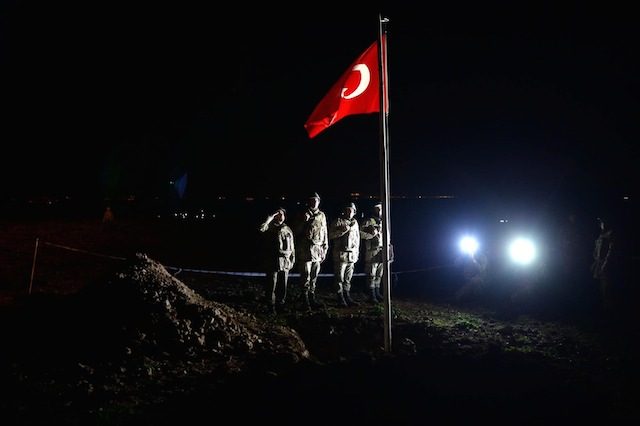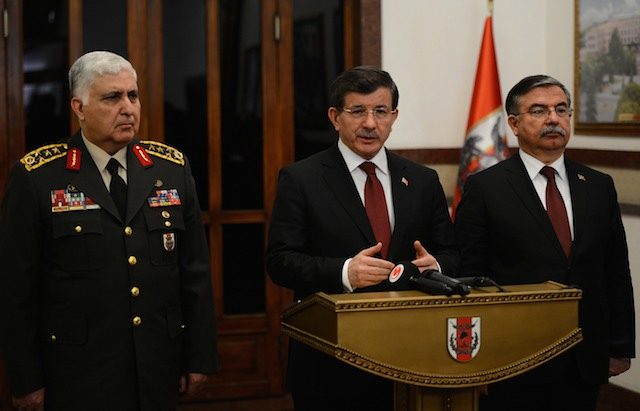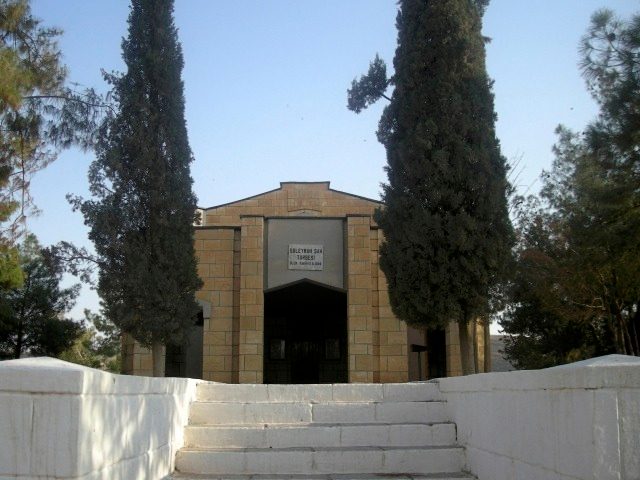SUMMARY
This is AI generated summarization, which may have errors. For context, always refer to the full article.

ANKARA, Turkey (2nd UPDATE) – Turkish forces swept into Syria overnight to rescue about 40 soldiers who had been surrounded for months by Islamic State (ISIS) militants while guarding the tomb of a revered Turkish figure.
The operation, which involved tanks, drones, reconnaissance planes as well as several hundred ground troops, was the first such incursion by Turkish troops into Syria since the start of the civil war there nearly 4 years ago.
The military said no clashes took place during the operation although one soldier had been killed in an accident.
The 38 soldiers who had been guarding the tomb of Suleyman Shah, grandfather of the founder of the Ottoman Empire, were brought safely home. The tomb, which is on a site within Syria that Ankara considers sovereign territory, was relocated.
Normally, the detachment is rotated every 6 months but the last one was trapped there for 8 months by ISIS fighters.
Prime Minister Ahmet Davutoglu told a news conference on Sunday, February 22, that Turkey had not sought permission or assistance for the mission but had informed allies in the coalition against ISIS once it began.
“This was an extremely successful operation with no loss to our rights under international law,” he said, flanked by the chief of the military and the defense minister.
A Turkish security source said the operation was conducted via the Syrian Kurdish border town of Kobani with the support of local Kurdish authorities. Kurdish forces, backed by US-led air strikes, drove Islamic State from Kobani last month.
The Turkish foreign ministry said the tomb had been temporarily moved to a new site within Syria north of the village of Esmesi close to the Turkish border.
Davutoglu said about 100 military vehicles, including 39 tanks, were involved along with 572 military personnel including special forces commandos. Turkish fighter jets were on alert during the mission but did not need to be deployed, he said.

There was no immediate reaction from the Syrian authorities.
Operation ‘Shah Euphrates’
Turkey has been reluctant to take an active role in the US-led military campaign against ISIS, partly because it wants to see the military action target Syrian President Bashar al-Assad’s forces as much as the insurgents.
But the Turkish government said late last year that ISIS militants were advancing on the mausoleum, perched on the banks of the Euphrates river and made Turkish territory under a treaty signed with France in 1921, when France ruled Syria.
Davutoglu had repeatedly said that Turkey would retaliate against any attack on the tomb, which was located 37 km (23 miles) from the Syrian border before being moved overnight.
“Countries which do not look after their historic symbols cannot build their future,” he said on Sunday.
Two operations were carried out simultaneously as part of what was dubbed operation “Shah Euphrates”, Davutoglu said, one to Suleyman Shah and the other to secure the area around Esmesi. He said the remaining buildings at the original site were destroyed to prevent their use after the remains were removed.

Photographs published by the state news agency Anadolu showed Turkish soldiers pitching a flag pole where the tomb is being relocated. Davutoglu said it would be returned to its previous location once conditions allowed.
ISIS and other Islamist groups, whose strict Salafi interpretation of Islam deems the veneration of tombs to be idolatrous, have destroyed several tombs and mosques in Syria.
Suleyman Shah was the grandfather of Osman I who founded the Ottoman Empire in 1299. Traveling through modern-day Syria, he fell off his horse and drowned in the Euphrates near the site of the mausoleum, according to historians. – With reports from Daren Butler, Ayla Jean Yackley and Humeyra Pamuk in Istanbul, Seyhmus Cakan in Diyarbakir, Reuters / Rappler.com
Add a comment
How does this make you feel?
There are no comments yet. Add your comment to start the conversation.